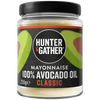Meet the Fabulous Kenyan Farmers Working Their Hass’s Off to Bring us Amazing Avocado Oil!
We travelled all the way to Kenya to Hunt and Gather the finest avocados for our Extra Virgin Avocado Oil – and for good reason! Not only is our avo oil nutritious and delicious but it’s also produced to be as sustainable and ethical as can be. We’d love to share with you the benefits of our relationship with the Kenyan farmers who make our Avo oil possible. Read on to discover why it’s as good for the planet and its people as it is for you!
Contributing to Communities
The importance of human contact, relationships and creating a sense of community are things we are incredibly passionate about. That’s why we travelled all the way to Kenya to meet with the fabulous farmers that work tirelessly to grow the amazing avos we use in our oil.
Our avo oil is crafted from the finest hand gathered and hand sorted Kenyan Hass avocados. Many pairs of hands are required to do this! In fact, over 50 jobs are created during the processing season to ensure the fruit is sorted optimally. Other facilities get by with employing fewer people, and having more hands-on-deck doesn't save money but it does ensure high quality and local employment.We work closely with small-scale farmers who use the yield of their field to give back to and grow their local community. These farmers form co-operatives that enable them to support each other, as well as improving selling and distribution prospects. What’s more, the money we provide goes towards paying for qualified agronomists (crop whisperer to you and me!) who assist and mentor farmers to help them get the most from their trees.
Warmer climates and worsening drought make it harder for Kenyan farmers to persist with their traditional staple crop of coffee. The Haas trees are very tolerant to the variable rainfall conditions in Kenya and require much lower maintenance than coffee crops – good news for the farmers for sure. That’s why many farmers are opting to also grow avocados for a reliable income.
Reducing Waste
When it comes to selling avocados, the export market is predominant for Kenyan farmers – but it is one which is very superficially and aesthetically orientated. This means that many avos are tossed away because of their colour, shape or size. Not only is this a massive waste of time and effort for the farmers, but it’s also a devastating waste of nutrition!

Things like sunburn, skin defects, superficial fly attack or even just being the wrong shape or size can be enough to see the fruit go to waste, or else sold off in the local market for the equivalent of pennies. Whilst they may cause the brown spots, dry patches or lumps and bumps that make avos look less than perfect – these are all superficial attributes and don’t affect the quality of the crop whatsoever. Buying the fruits that wouldn’t make the Insta ad means that the farmers who provide us with our avos receive additional income as we pay a fair price as well as us doing our bit to avoid good food going to waste.
Protecting the Planet
Modern farming practices can be incredibly efficient but at what cost to the planet? Things like pesticides, herbicides and mono-cropping might give the best yield in farming but they often leave a trail of destruction in their path. Our Kenyan farming wizards use natural and non-invasive farming methods to protect the plant as well as the planet. Let’s take a look:
- Minimising Monocropping - Monocropping is using the same land for the same crop season after season. It’s bad news because it can deplete the soil of essential nutrients, making it harder to grow in the first place and producing crops with a substandard nutritional profile. When it comes to growing our avos, monocrops are avoided to ensure year-round income for farmers and that soil and environmental condition is not compromised. Many of our farmers have only 3-4 Haas trees and dabble in growing other fruit and veg – such as bananas, mango and macadamia – to counter the monopolising effects of the coffee growing industry.
- Organic Farming Practices – Instead of harmful herbicides and pesticides, our farmers utilise Mother Nature to manage and protect their crops! They use sticky fly tabs on trees to protect from pests, manure from local cows to help them grow and natural lime to control soil pH. For a reliable water supply in an area susceptible to drought, trenches are dug near trees to ingeniously capture water from rainfall! Irrigation is used on larger farms and water is pumped from the river supply during heavy rainfall, with excess being stored in reservoirs in times of plentiful supply.

- Wildlife Welfare – The bees which pollinate our Kenyan avocado trees live wild and free, as opposed to being shipped in – which is surprisingly the case with many vast commercial crops. The same bees are used to cross pollinate trees and many other crops such as coffee and mango. This is so important because bees play a crucial role in maintaining precious eco-systems that produce food, protect habitats and increase diversity worldwide. They’re also in massive decline, which will eventually have devastating effects on the planet. Keeping the buzz going small-scale farms is just one way we can do our bit to help solve the problem!
- It’s Oil About Planning - We bottle our oil once it’s landed in this country to avoid unnecessarily transporting glass bottles. This saves on space and fuel, minimising our carbon footprint and the environmental impact we have in getting them from tree to plate! What’s more, our glass bottles are 100% recyclable – check out these 10 quirky ideas for recycling, reusing and re-loving your empty jars and glassware for some eco-inspiration!
- Farmers of the Future - Haas trees produce two yields of avocados every year, the main harvest and a second, smaller harvest. The trees begin producing fruit from 3 years of age and starts to mature by age 5, they can continue to bear fruit for up to 30 years if farmed to their true potential. Producing fruit from March through to August, the farmers certainly get fair cash for their Haas! To keep the good times rolling we provide saplings free of charge to the farmers – so they can have fruit-bearing trees that will last for years to come, sustaining future generations of farmers.

So, there you have it, the labour of love that goes into creating every bottle of our silky-smooth emerald avocado oil!
Every drizzle and sizzle contributes to creating communities, reducing waste and protecting the planet – is that the taste of a mission accomplished?
Like our entire range, our products are an investment in health and happiness, as well as your taste buds – oil drink to that!
All information provided on our website and within our articles is simply information, opinion, anecdotal thoughts and experiences to provide you with the tools to thrive.
It is not intended to treat or diagnose symptoms and is definitely not intended to be misconstrued for medical advice. We always advise you seek the advice of a trained professional when implementing any changes to your lifestyle and dietary habits.
We do however recommend seeking the services of a trained professional who questions the conventional wisdom to enable you to become the best version of yourself.

















